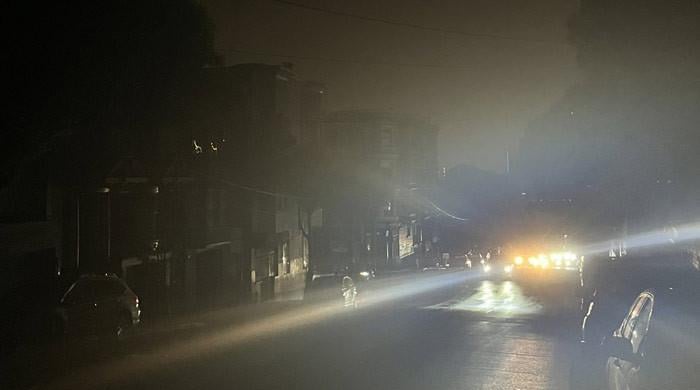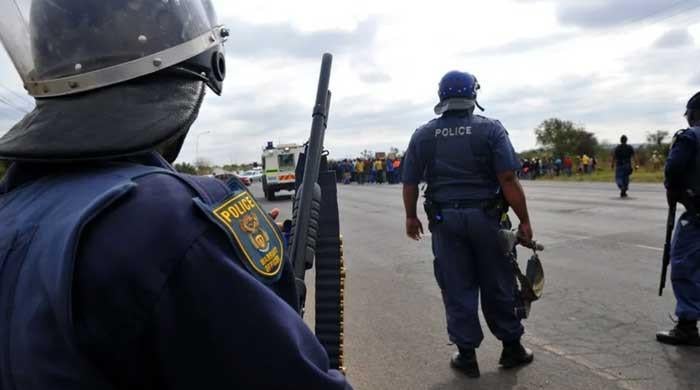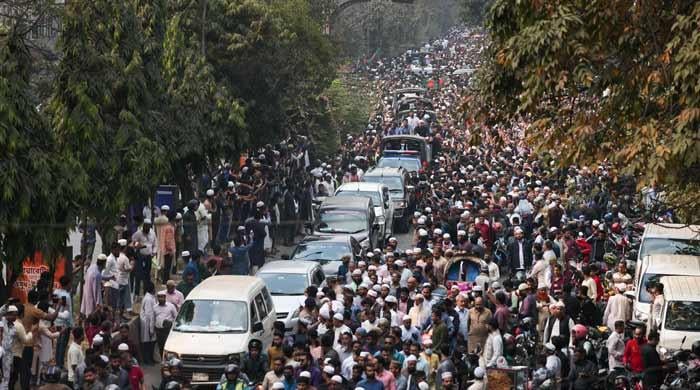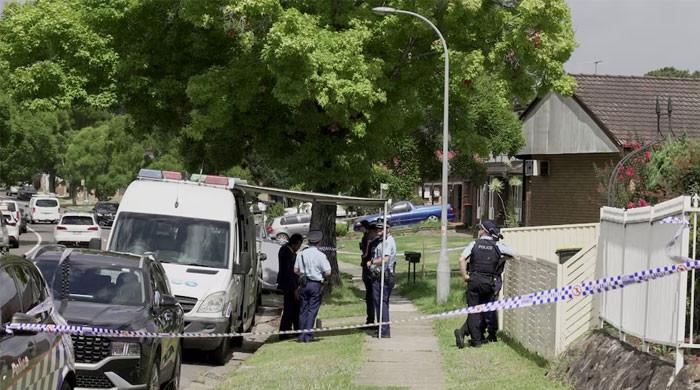Protests in Shanghai and Beijing as anger over China's COVID curbs mounts
Protests flare against heavy COVID curbs following deadly fire in country's far west sparked widespread anger
November 27, 2022
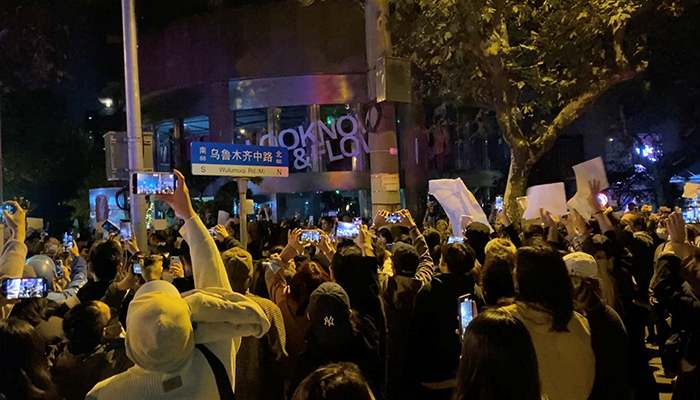
- Wave of civil disobedience unprecedented under Xi Jinping.
- Protesters hold vigils in Beijing, Shanghai and other cities.
- Anger over Urumqi factory fire and COVID curbs.
SHANGHAI/BEIJING: Crowds of demonstrators in Shanghai shouted and held up blank sheets of paper early on Sunday evening, as protests flared in China against heavy COVID-19 curbs following a deadly fire in the country's far west sparked widespread anger.
The wave of civil disobedience, which has included protests in cities including Beijing and Urumqi, where the fire occurred, is unprecedented in mainland China since Xi Jinping assumed power a decade ago.
In Shanghai, China's most populous city, residents had gathered on Saturday night at Wulumuqi Road — which is named after Urumqi — for a candlelight vigil that turned into a protest in the early hours of Sunday.
As a large group of police looked on, the crowd held up blank sheets of paper as a protest symbol against censorship. Later on, they shouted, "lift lockdown for Urumqi, lift lockdown for Xinjiang, lift lockdown for all of China!", according to a video circulated on social media.
Later, a large group chanted "Down with the Chinese Communist Party, down with Xi Jinping", according to witnesses and videos, in a rare public protest against the country's leadership.
Reuters could not independently verify the footage.
Later on Sunday, police kept a heavy presence on Wulumuqi Road and cordoned off surrounding streets, making an arrest that triggered protests from onlookers, according to unverified videos seen by Reuters.
By evening, hundreds of people had gathered again near one of the cordons, some holding blank sheets of paper.
"I am here because of the fire accident in Urumqi. I am here for freedom. Winter is coming. We need our freedom," one protestor told Reuters.
At Beijing's prestigious Tsinghua University, dozens of people held a peaceful protest against COVID restrictions during which they sang the national anthem, according to images and videos posted on social media.
In one video, which Reuters was unable to verify, a Tsinghua university student called on a cheering crowd to speak out. "If we don’t dare to speak out because we are scared of being smeared, our people will be disappointed in us. As a Tsinghua university student, I will regret it for all my life."
One student who saw the Tsinghua protest described to Reuters feeling taken aback by the protest at one of China's most elite universities, and Xi's alma mater.
"People there were very passionate, the sight of it was impressive," the student said, declining to be named given the sensitivity of the matter.
Thursday's fire that killed 10 people in a high-rise building in Urumqi, capital of the Xinjiang region, saw crowds there take to the street on Friday evening, chanting "End the lockdown!" and pumping their fists in the air, according to unverified videos on social media.
Many internet users believe that residents were not able to escape in time because the building was partially locked down, which city officials denied. In Urumqi, a city of 4 million, some people have been locked down for as long as 100 days.
Zero-COVID
China has stuck with Xi's signature zero-COVID policy even as much of the world has lifted most restrictions. While low by global standards, China's cases have hit record highs for days, with nearly 40,000 new infections on Saturday.
China defends the policy as life-saving and necessary to prevent overwhelming the healthcare system. Officials have vowed to continue with it despite the growing public pushback and its mounting economic toll.
China's economy suffered a broad slowdown in October as factory output grew more slowly than expected and retail sales fell for the first time in five months, underscoring faltering demand at home and abroad.
Adding to a raft of weak data in recent days, China reported on Sunday that industrial firms saw overall profits fall further in the January-October period, with 22 of China's 41 major industrial sectors showing a decline.
The world's second-largest economy is also facing other headwinds including a global recession risks and a property downturn.
Widespread public protest is extremely rare in China, where room for dissent has been all but eliminated under Xi, forcing citizens mostly to vent on social media, where they play cat-and-mouse with censors.
Frustration is boiling just over a month after Xi secured a third term at the helm of China's Communist Party.
"This will put serious pressure on the party to respond. There is a good chance that one response will be repression, and they will arrest and prosecute some protesters," said Dan Mattingly, assistant professor of political science at Yale University.
Still, he said, the unrest is far from that seen in 1989, when protests culminated in the bloody crackdown in Tiananmen Square. He added that as long as Xi had China's elite and the military on his side, he would not face any meaningful risk to his hold on power.
This weekend, Xinjiang Communist Party Secretary Ma Xingrui called for the region to step up security maintenance and curb the "illegal violent rejection of COVID-prevention measures".
Xinjiang officials have also said public transport services will gradually resume from Monday in Urumqi.
'We don't want health codes'
Other cities that have seen public dissent include Lanzhou in the northwest where residents on Saturday upturned COVID staff tents and smashed testing booths, posts on social media showed. Protesters said they were put under lockdown even though no one had tested positive.
Candlelight vigils for the Urumqi victims took place at universities in cities such as Nanjing and Beijing.
Shanghai's 25 million people were put under lockdown for two months earlier this year, provoking anger and protests.
Chinese authorities have since then sought to be more targeted in their COVID curbs, an effort that has been challenged by the surge in infections as the country faces its first winter with the highly transmissible Omicron variant.




